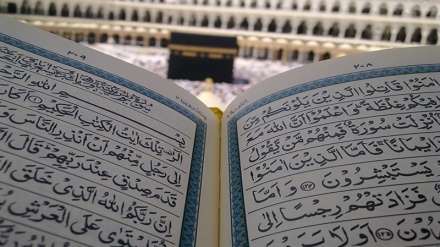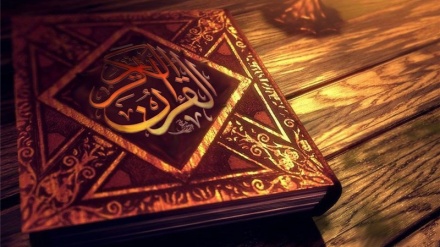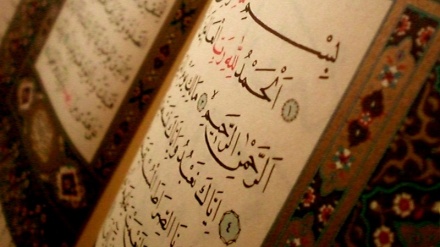Path towards Enlightenment (1015)
Salaam, and welcome to our latest episode of “Path towards Enlightenment”, which is an endeavour to make you and us familiar with an easy and fluent explanation of God’s Final Scripture to all mankind, the holy Qur’an that was revealed to the Last and Greatest of all Messengers, Prophet Muhammad (blessings of God upon him and his progeny).
Last Friday we started explanation of “Surah Talaq”, which as its name suggests, means ‘divorce’, and outlines the lawful procedures by which a Muslim couple may have a fair parting if marriage has reached the point of no reconciliation between husband and wife, but after persuasion by the well-wishers for the sake of children and also to avert the resulting trauma. The Surah has 12 Ayahs of which 5 were explained last week and today we will complete the next 7, which strongly urge people to observe God’s regulations and guidance by reminding the fate that befell the disobedient nations of the past, as well as the rewards reserved for the obedient who are cognizant of God’s Power and Knowledge of everything.
Here we invite you to listen to Ayahs 6 and 7:
“House them where you live, in accordance with your means, and do not harass them to put them in straits, and should they be pregnant, maintain them until they deliver. Then, if they suckle [the baby] for you, give them their wages and consult together honourably; but if you make things difficult for each other, then another woman will suckle [the baby] for him.
“Let the affluent man spend out of his affluence, and let he whose provision has been tightened spend out of what Allah has given him. Allah does not task any soul except [according to] what He has given it. Allah will bring about ease after hardship.”
If you might recall, last week we said that in case of pregnancy, the divorced woman, even if the iddah or the three-month waiting period is over, should wait till the birth of the child for formalization of the separation and should not marry another person. A child has rights even if it is in the mother’s womb, and the father is required to fulfill his responsibility by providing sustenance to the divorced woman till the birth of the child.
The Ayahs that we recited to you now emphasize the rights of the ex-wife during the three-month term after divorce, explicitly saying that she should not be harassed and should be properly accommodated and fed. And in case of pregnancy, the ex-husband should provide her needs with all her needs till delivery childbirth, if the mother is willing to suckle the infant, she should receive remuneration otherwise a wet nurse should be arranged. Moreover, the ex-wife and ex-husband should consult each other regarding childcare and make befitting decisions for the future of the infant, lest their differences adversely affect the child physically and emotionally. In other words, parents, even if they have been divorced are supposed to remember God Almighty in such instances without jeopardizing the future of their innocent children.
Ayah 7 sets the duties in accordance with the financial ability of the ex-husband, who if rich should spend as per his status, and if poor should spend from whatever God has given him, since the Almighty Creator never obliges anyone beyond their capacity. At the same time, the ex-wife should not find fault with her former husband. The Divine Promise of providing ease after hardship is always true.
These Ayahs teach us the following points:
- During the three-month iddah or waiting period following divorce to be formalized, the ex-husband should not humiliate the ex-wife or deprive her of food and lodging.
- In case of pregnancy, the waiting period after divorce is extended till childbirth in order to safeguard the right of both the child and its father, who is responsible for all provisions, as per his financial abilities, including remuneration for the mother for suckling the infant.
- Parents, even if divorced should consult each other concerning the future of their child or children, with trust in God’s Promise to bring ease after hardship.
Now we invite you to listen to ayahs 8, 9, and 10 of the same Surah:
“How many a town defied the command of its Lord and His Prophets; then We called it to a severe account and punished it with a dire punishment.
“So it tasted the evil consequence of its conduct, and the outcome of its conduct was ruin.
“Allah has prepared for them a severe punishment. So be wary of Allah, O you who possess intellect and have faith! Allah has already sent down to you a Reminder.”
These Ayahs, following the rules and regulations set for divorce, warn Muslims of the dire consequences of disobeying Divine commands by reminding them of the fate that befell the sinful nations of the past. The All-Merciful Lord does not wrong anyone, and it is the human beings themselves who bring ruin upon themselves by indulging in sins and committing evil deeds, whose bitter consequences are tasted by those who continue to disbelieve and those who do not repent and seek forgiveness.
Ayah 10 says severe torments and chastisement are in store for such wicked people in the Hereafter. It then addresses persons of intellect and refers to the revelation of the holy Qur’an as a Reminder sent by God for all mankind with its expounding of all the Injunctions and Laws as well as the accurate forms of devotions, transactions and whatever is required by people in the affairs of this world and the Hereafter.
These Ayahs teach us that:
- Disobedience and defiance of Divine commandments entails punishment both in the brief life of this transient world and in the Hereafter.
- The All-Merciful Creator never harms anyone and has created the bliss of Paradise for His creatures who obey Him, but the disbelievers bring ruin and torment upon themselves by indulging in sins.
- Intellect and faith are not separate, and together bring about proper cognizance of God Almighty.
- The Holy Qur’an is a constant Reminder in preventing us from disbelief and disobedience, and guiding us towards the eternal bliss of Paradise.
Here we present you Ayah 11:
“A Messenger (of God) reciting to you the manifest signs of Allah that He may bring out those who have faith and do righteous deeds from darkness into light; and whoever has faith in Allah and does righteous deeds, He (God) shall admit him into gardens with streams running in them, to remain in them forever. Allah has certainly granted him an excellent provision.”
The goal of raising the Messenger and the Revelation of the Heavenly Scripture to him is to deliver mankind from disbelief, ignorance, sins, and corruption through recitation of the blessed Ayahs of the Holy Qur’an in order to awaken consciences and lead human beings into the light of faith, monotheism, and proper cognizance of God Almighty.
The Ayah closes with tidings of the rewards of Paradise for those who believe and do righteous deeds, saying that one who have faith and stands steadfast on the path of truth shall remain forever in the heavenly gardens where God has prepared an excellent provision for the virtuous.
This Ayah teaches us the following points:
- The Heavenly Scripture is not enough for the guidance of mankind and needs the Divine Messenger to act as the perfect model of what he preaches by putting into practice the injunctions of the Holy Qur’an.
- There are numerous deviant paths leading to destruction as opposed to the one straight and unwavering path that leads to the eternal bliss of Paradise.
- The mission of the Prophets is salvation of mankind through manifestation of Truth.
We end Surah Talaq by explaining its 12th and last Ayah which reads:
“It is Allah who has created seven heavens, and of the earth similar to them. The command gradually descends through them, that you may know that Allah has power over all things, and that Allah comprehends all things in knowledge.”
This Ayah points to the vastness of the universe and the wonders of Planet Earth with its orderly functioning in order to apprise mankind of the Omnipotence and Omniscience of the One and Only Creator so that through adherence to the concept of monotheism the spiritual growth of human beings is ensured.
The number seven indicates multiplicity, and is a reference to a reference to the innumerable celestial spheres and heavenly bodies resembling the Planet Earth. At any rate, in view of our meagre knowledge concerning the cosmos beyond the solar system, it would be hard to think of numbers, though astronomers that the galaxy is made up of millions of millions of celestial bodies, some of whose conditions may resemble those of the Earth. This means, scientific advancements in the future may provide us with further details concerning the exegesis of such blessed Ayahs of the holy Qur’an, which emphasize the Infinite Power of God and His management of the entire affairs, with monotheism being the pivot.
From this Ayah we learn the following points:
- The entire universe, including Planet Earth, all of which functions in an orderly manner, is the handiwork of the One and Only Creator Whose Power indicates monotheism.
- Reflection on the wonders of creation leads to proper cognizance of Allah and His Greatness.
- Allah’s Knowledge and Wisdom encompasses all and everything.
Next week we start the exegesis of Surah Tahrim, until then goodbye and God bless you.
RM/AS/SS


